'60's & '70's American Psychedelic Rock
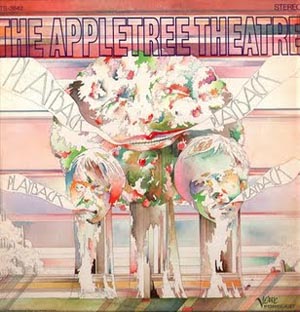
The 5th Level of Obscurity, Part 3
by Gary Bearman
(April 2015)
This is the third in a series of articles focusing on lesser known groups from my favorite genres. Part 1 on Krautrock can be found here, and Part 2 on '70's American Progressive Rock is here. Please sign up to follow the progress on my blog 'The Mind Festival' here, where I'm working on compiling a list of my 1,000 favorite albums, in order.
The way I've defined levels of obscurity within a genre is like this:
1st level - bands any general music fan has heard of
2nd level - bands any casual fan of the genre has heard of
3rd level - bands anyone who has dipped their toe into the genre a little bit knows of
4th level - bands known only to those who are pretty obsessively into the genre
5th level - bands known only to those who've really thoroughly researched well into the genre
Psychedelic music swept the world in the late '60's, and followed into the early '70's and beyond, but most of the great stuff came out of the UK, and especially the United States. It was a very fertile period of music fuelled by psychedelic drugs to an extent, but it was also generally a time of discovery, of breaking the rules and wild experimentation as people started to rapidly move away from antiquated beliefs and structures, and this was intimately reflected in the music of the times.
Psychedelic rock is a genre I've loved dearly for many years, and you'll hear me use words like 'classic' and 'masterpiece' quite a few times here, but that's only after sorting through many hundreds of lesser albums, so I don't use the terms casually. The late '60's and early '70's experienced a tremendous musical renaissance, and it was an amazingly rich period of creativity where music really broke loose, took you on an exciting adventures and spawned a treasure trove of gems, many of which didn't get nearly the exposure they deserved at the time. Here are a dozen of those:
Appletree Theater Playback (1967)
Appletree Theater's sole album Playback is a unique and interesting concept album. Some tracks stand out more than others, but the whole thing is really fun, and when the songs are great, they're really great. Some moments, like the brief opening "...in the beginning" are a little goofy, but if you aren't hypercritical and just sit back and enjoy the ride, you'll have a great time, especially as the song shortly morphs into the beautifully stoned "Hightower Square."
"Hightower Square,
it's really not fair
that I'm up here so high.
I wouldn't think it so bad,
they all look so sad,
I bet they wish they could fly."
"Saturday Morning" is a very pretty song about wandering around the city, which segues into the gorgeous "Nevertheless It Was Italy," containing interesting brass and baroque instrumentation, as well as intriguing lyrics:
"I saw a painting on the wall,
my little friend had to point it out to me.
It wasn't bad, but above all,
it made my head feel small, with history.
Who could know,
it would be so long ago,
and I removed myself from time,
and found it interesting."
"I Wonder If Louise Is Home" continues the journey of a man wondering if his old crush Louise is at home and remembers him, followed by "Chez Louise," a performance piece of the man knocking on the door of Louise's house and answered by a burned out hippie who invites him in, but the man is too shy and square to follow through and says he has to go home back to Queens, which then leads into "E-TRAIN" about the regretful trip home.
Side two opens with the elegant "You're the Biggest Thing in My Life," with melodic laid back vocals, superb instrumentation and production that leaves room for a demented fuzz guitar solo. "The Sorry State of Staying Awake" is a great spoken word bit of two people in a car talking about taking drugs to stay awake while spinning through the radio dial with hilarious period snippets of news, songs, and DJ ramblings. The instrumental "Lotus Flower" features intense psychedelic backwards music sections sandwiched between more straight ahead sections. "What a Way to Go" is the beautiful closing track with very poignant lyrics:
"I think it's time you were going,
the world we live in is growing so very small.
There's not much room for this kind of life,
there's not much room for us at all."
The overall concept is a loose one, and it takes a lot of odd, angular detours, but it's a truly enjoyable journey that doesn't take itself too seriously.
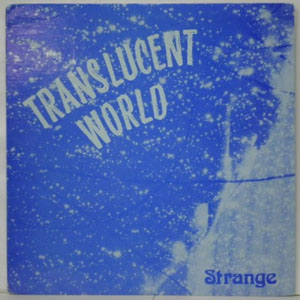
Terry Brooks & Strange Translucent World (1973)
This massive, heavy, psychedelic masterpiece was released on the appropriately named Outer Galaxie label in Florida. It doesn't take a lot of brain power to find out who influenced the opening track "Jimi." We start with some brilliant feedback, before moving into an absolute electric guitar scorcher. And then the insane vocals come in. Terry's got a great voice, and he sings in his regular range, as well as falsetto, both with intense power in a way that heavy metal giants like Ronnie James Dio and Rob Halford would do soon after. This guy could seriously play the shit out of his guitar, and the soloing and feedback will absolutely fry your brain.
"Jimi" is a stunning track, but what follows, the 11-minute "Ruler of the Universe," is something from another world entirely. The song starts with a slow bass riff, a pleasant drum pattern is added in, and pretty soon there's more of that intense out-of-this-world guitar soloing coming from all directions, along with what sounds like an organ or synthesizer, but is probably also guitar. The lyrics talk about people who come from the stars who need no words to communicate, and then goes off about finding the angel of the universe a thousand light years away. It would almost be corny if it wasn't sung so damn sincerely and played with such utter commitment. At the 4-minute mark the song picks up steam, with the guitar soloing getting more and more gloriously over the top. At the 6-minute mark we enter the stratosphere, with sound effects that literally have to be heard to be believed. It sounds like a few dozen light saber battles between the good and dark side of the force doing battle on a cosmic scale. On the 10th or so listen, you'll realize that the rhythm section is continuing on dutifully in the background, while musical insanity explodes on top of it.
For many years, I thought these sounds had to come from some brilliant musician doing ungodly things on a synthesizer, but then a few years ago I had the rare pleasure of speaking to Mr. Brooks himself on the phone, and he let me know that those sounds were actually guitar sounds with tons of feedback created by placing monitors really close together and having them feed back upon each other. Ok, the explanation was a lot more technical than that, but that's the layman's version that I remember. Regardless, the track is out of control madness, and is literally my favorite song of all time alongside the long version of Pink Floyd's "Interstellar Overdrive" from the soundtrack to Tonite Let's All Make Love in London.
Side two starts with the 6-minute "Kiss of a Butterfly." The song opens with what has to be a synthesizer, but again it's very possibly Terry Brooks using his feedback magic again. This contains more powerful falsetto lyrics and guitar madness. On the surface, the lyrics are almost gaudy, but again in context, and sung with the sincerity that they are, it somehow works, especially when he asks, "Have you ever dreamed you were dreaming?" The utter uniqueness of the song and the insane guitar soloing carry it over the top. "Hey Mr. Lonely Man" is a bluesy song, but played very upbeat, and is one of the happier psychedelic blues song you're likely to come across. The final track "Lost" contains some great guitar riffs and harmonics, what really HAS to be a synthesizer, heartbreaking lyrics and fantastic musicianship. Terry Brooks would make several more albums, but none quite as successful as this 1973 hard rock/psychedelic rock fantastically over-the-top classic.

The Electronic Hole The Electronic Hole (1970)
As the story goes, Phil Pearlman, who had previously released the self-titled Beat of the Earth in 1967, was looking to recruit musicians for his next project, so he recorded a full album of demos for private use to give future potential participants an idea of the direction he was going in, because that's what everyone does, right? There is debate whether this is officially a Beat of the Earth album, or whether it's just called The Electronic Hole. What isn't up for debate however, is this is one fantastic album. Yes, the songs have a raw, somewhat unfinished demo quality to them, but if these are raw demos, I can only imagine how amazing the final result would have been, as the songs are high quality as they are. The individual songs are untitled, making it difficult to talk about specific tracks. Side one contains five tracks and is known only as "The Golden Hour" (though some online sources call it "The Golden Hill"). Every song is killer, containing highly consistent, extremely trippy and mesmerizing psychedelic garage rock with Pearlman's distinctive acoustic and electric guitar, sitar, harmonica and appealing vocals. The lyrics are spiritual and surreal, such as this on track two:
"Land of Odin, land of God,
everybody feels the prod,
of the will and the way,
and you slowly reach on through the day.
Gates of Eden, gates of time,
gates of never-ending rhyme.
Yes I will, yes I will,
yes I will find the golden hill."
Side two, called "Love Will Find a Way," is just two tracks. The first one is a 7-minute hypnotic fuzzy cover of "Trouble Every Day" by The Mothers of Invention. Track two is a long, rough track that could have been improved upon with a better mix, as the excellent fuzzy electric guitar is a bit buried, but it's still great, sounding like a decent quality audience recording of a late 60's Velvet Underground concert.
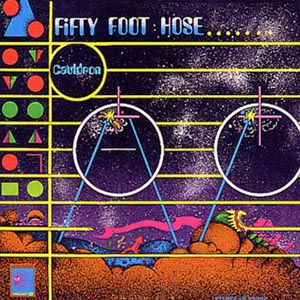
Fifty Foot Hose Cauldron (1967)
Cauldron is somewhat legendary among aficionados of obscure off-the-wall psychedelia, and of early electronic music, being revolutionary in a similar fashion to the group Silver Apples. The album is interspersed with brief electronic tracks, and those sounds also completely permeate the actual songs, but we're not talking Tangerine Dream here, we're talking the primitive oscillator/audio generator/tone control/theremin type of electronics from 1967. The electronic sounds are thoroughly dated, yet utterly charming and appealing. The first full-on "song" is "If Not This Time," featuring gorgeous echoed female vocals, crazy lyrics and wonderfully random sounding riffs, filled with wacky theremin and other assorted whizz-bang electronic sounds. The effect is mesmerizing. "The Things That Concern You" features male vocals and contains more of the same '60's madness. "Red the Sign Post" has a vaguely punkish feel to it, with intense female vocals and great fuzz guitar and wild effects.
The strangeness comes to a head later on in the album with the title track "Cauldron," which is one of the weirdest, most fucked-up songs you're ever likely to come across, sounding like the soundtrack to an incredibly bizarre horror film. The heavily echoed and treated vocals about a burning, bubbling cauldron of sorrow are more of a poetic recitation then singing, with the sound of people crying in the background, all with some deeply warped electronics. The closest comparison would be some of the weirdest sections of the White Noise album An Electronic Storm.
Other highlights include the brilliant 10-minute "Fantasy," featuring classic '60's killer jamming, great vocals, and a messed-up electronic section near the end. It's a very psychedelic affair that is one of the better longer tracks of 1967. The album also includes a surprisingly beautiful version of "God Bless the Child" that sounds almost completely straightforward, until you notice the bubbling, gurgling electronics that float atop the entire song. Cauldron is a groundbreaking and truly demented 1967 masterpiece.
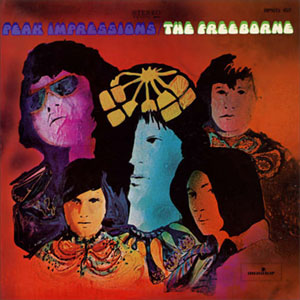
The Freeborne Peak Impressions (1968)
Peak Impressions is the solitary gem released by the Boston band The Freeborne on the Monitor label. The album starts with three of the most perfect lysergic psychedelic songs of the era: "Images," "Land of Diana" and "Visions of My Own." "Land of Diana" contains some very inventive singing, brief frantic guitar freak-outs followed by lounge music, and even contains a brief, unexpected doo-wop section. Beautiful lyrics abound, such as this from "Visions of My Own":
"My mind swells like the sea,
an ocean
of complexity"
The song ends with some marching band drums and flute that serves as a perfect segue to the brief, "Sadly Acknowledged," an anti-war dirge with lyrics that are perhaps obvious, yet very effective, and shows that while they were obviously having a mind-expanding good time, they were also aware of the realities of the world around them. If there's any doubt what fueled the creation of this album, however, it's answered overtly in the stunning 7-minute psychedelic opus "Peak Impressions & Thoughts," where they sing:
"The acid burns furrows in my brain.
You know I'll never come down again."
The song changes speed often, and is filled with great '60's organ breaks, cacophonous drumming and insane guitar soloing.
Side two showcases the group's diversity. "Yellow Sky" is a return to the shorter, trippy tracks that started side one. "Hurtin' Kind of Woman" is the obligatory '60's blues number, but done with enough psychedelic effects, especially the excellent organ noodling, to keep it thematic and interesting. The brief "Inside People" features very distorted vocals and organ that sounds like descending piano runs. "A New Song of Orestes" is an exercise in baroque experimentation, complete with a spoken poetic interlude, and here we hear echoes of other more well-known Bosstown Sound groups like Ultimate Spinach and The Beacon Street Union. The album ends with the quirky 9-minute oddity that is "But I Must Return to Frenzy," which starts with off as a psychedelic guitar song before turning into a stilted baroque experiment with extended brass and piano sections before finally coming full circle. Side two isn't as completely successful as side one, but you have to admire their everything and the kitchen sink experimental spirit that produced one of the more interesting and unique albums of the era.
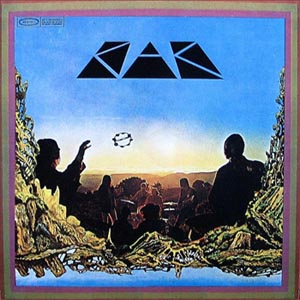
Kak Kak (1969)
The sole 1969 self-titled album by Kak was released on Epic Records, which wouldn't normally qualify it as obscure, however it sold very poorly and is now a collector's item. It's well known by hardcore psych fans, but precious few other people, and it's a shame because it's a stone cold classic, containing some absolutely monster '60's classics.
The first short track "HCO 97658" starts with the sound of band members laughing, which is apropos for the good time you're about to have. The first thing you'll notice are the absolutely KILLER electric guitar leads, as well as the stellar production. "Everything's Changing" is a catchy heavy psych song with clear vocals, amazing guitar work and interesting lyrics:
"This world would be a better place,
if left undone.
The changes that have taken place,
are all the wrong ones.
I think you know."
"Electric Sailor," which should have been a big hit, takes the intensity up another notch and describes an idealized hippie with an awesome echoed chorus to go along with the crunching riffs. "Disbelievin'" takes it down a couple of notches, and has a strong bluesy feel with oodles of smoking guitar. "I've Got Time" and "Flowing By" are two very pretty ballads that espouse hippie philosophies of love, being in the moment and traveling.
The heaviness and the relentless electric guitar leads comes back on side two with the excellent, rocking "Bryte 'N' Clear Day." And then we come to the two long songs on the album, both of which belong on a short list of the best songs of the decade. The 8+ minute "Trieulogy," featuring top-notch musicianship, has three distinct sections, which makes sense since it was originally three separate songs that they sandwiched together seamlessly. The song has moments of heaviness and moments of relentlessly-catchy melodies, psychedelic flourishes, great lyrics and amazing changes of pace. The final 6 minutes are dedicated to the trance-inducing, surreal and dreamy "Lemonade Kid." The song doesn't venture far from its mellow, stoned groove throughout its duration, but it's absolutely spellbinding with acoustic guitar, electric guitar, bongos, tablas and some kind of very effective drone sound. If I made a 1-disc compilation of the very best songs of the late '60's, "Lemonade Kid" would be my second to last track before "A Day in the Life." Kak is an absolute monster psych classic.
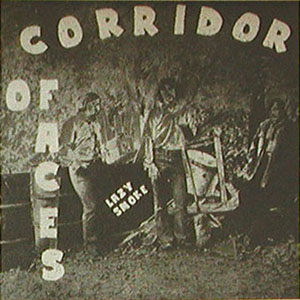
Lazy Smoke Corridor of Faces (1969)
Recorded on a budget, produced with care, attention and a bit of innocence, and released in micro-quantities on an obscure local label in Massachusetts, with original copies going for 4-figures, Corridor of Faces would have (or should have) been a massive success had it received the exposure it deserved. Having been raved about for years in the psychedelic underground, it's certainly far more well-known now than when the album was released. While to me it's a masterpiece, literally one of the 10 best psychedelic albums of all time, reactions are wildly mixed among psychedelic aficionados. Some unfairly dismiss them as a Beatles copy band, which completely undermines the stunning originality of the songs, the interesting, world-weary lyrics, superb melodic vocals and amazingly inventive musicianship.
The album is very easy to get lost in, and it's filled with odd arrangements and heaps of experimentation and effects that permeate most songs like backwards guitar, heavily echoed vocals, whispered sounds and just stunning electric guitar leads. Every track is brilliant. Here are some lyrics from my very favorite tracks:
From "All These Years:"
"Save yourself some misery,
and get away from here.
I'll help you disappear."
From "Come with the Day:"
"Years and years,
it takes so long,
years and years,
I can't go on."
From "There Was A Time:"
"There's so much trouble now, but I don't care.
There's so much trouble now, but I don't hear.
There was a time when all the people in the village would come out
just to smile.
There's just no love around, but I don't care.
There's just no love around, but I don't hear.
I think I'll lose myself among the trees that seem to be so free."
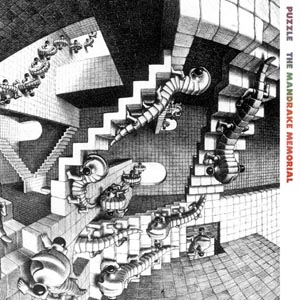
The Mandrake Memorial Puzzle (1969)
Puzzle is the 3rd album from Philadelphia's The Mandrake Memorial, and it's a complete and utter masterpiece. The cover is a complex Escher painting of stairways going in impossible directions, and the music echoes the imagery with mature, complex songs that often travel to wildly unexpected places. The album contains lush orchestration, outstanding keyboard work, soulful vocals with deep lyrics and enough atmosphere to fit a dozen albums. Containing a full 15 songs and clocking in it a massive 50+ minutes, with no separation between tracks, the thing is so disgustingly consistent that pulling out standout tracks is difficult. These lyrics are repeated in 3 different places on the album:
"Hey can you climb so high,
that when you look down,
it's just a blur?
Even with my feet on the ground,
my head would still be in the clouds"
"Kyrie" contains a sumptuous mix of baroque instrumentation and a chorus straight out of the Middle Ages. "Volcano" is a marvel of electronically manipulated feedback. Other songs end in tremendous crescendos, and the 9 1/2 minutes of "Bucket of Air" features medieval operatic vocals, dark whispers, marching drums, sound collage experimentation, atmospheric keyboards and interesting jams that go all over the place.
This psychedelic album, often bordering on proto-prog, will spoil you for most other albums that don't contain 1/10th this amount of creativity, talent and intelligence. The whole thing is probably far too ambitious and complex for any kind of mainstream popularity, but in a just world this would be on the short list of any discussion that involved the very best albums of the late 1960's.
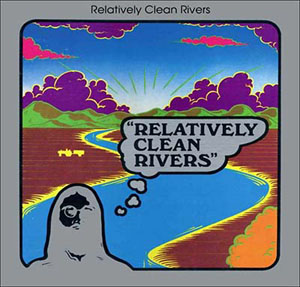
Relatively Clean Rivers Relatively Clean Rivers (1976)
Every once in a while you hear about that rare gem of an album that will change your life, but which rarely lives up to the hype. Relatively Clean Rivers is that perfect, dreamy, rural psychedelic album you've always prayed existed. The original album is hopelessly obscure, released in minute quantities and given away personally by its creator, but with incredible sound quality, and filled with effortless, fully-realized breezy '60's hippie music, even though the album is from 1976. Phil Pearlman (previously of Beat of the Earth, and the aforementioned The Electronic Hole) has a wonderfully clear voice, and his mix of acoustic and electric guitar is intoxicating. The closest comparison I can come up with is American Beauty-era Grateful Dead (this album is a guaranteed winner for any Dead fans, but will appeal to non-Deadheads as well), mixed with the sound of the Roger McGuinn tracks from the Easy Rider soundtrack.
Not coincidentally, the first track is in fact called "Easy Rider." This is the quintessential laid-back driving song, reminiscent of Canned Heat's "Going Up The Country," with intricate guitar work that carries you off into a California sunset. "Journey Through the Valley of O," easily one of my top 25 songs of all time, starts with some tinkling bells and tasteful harmonica, before the gorgeous vocals come through that book-end the song with some brief, intriguing, existential lyrics:
"Could I believe,
if I had nothing to gain?
Would I walk away to paradise,
or keep on playing the game?"
The middle section is instrumental, and it truly does take you on a mystical journey to nirvana. "Babylon" starts with some beautiful acoustic guitar, which after 40 seconds has a brief completely warped electronic synthesizer section lifted straight out of early 1970's Germany. The rest of the song is more '70's melodic mellow guitar heaven, interspersed again with these insane electronics that on first blush seem completely out of place, except for the fact that it somehow works brilliantly. "Last Flight to Eden" is a very pleasant instrumental for acoustic guitar and flute that ends with a brief electronic keyboard section played backwards.
Side two's opener "Hello Sunshine" starts with the sound of birds and the ocean before becoming an iconic, groovy West Coast track that is pure summer sunshine. "Spanish Caravan" is another intricate instrumental that starts with some great dual-tracked ethnic Spanish guitar before finding its groove with mellow electric guitar, drums, flute and some brief backwards sounds for flavoring. "A Thousand Years" ends the album with another hippie classic, including heartfelt lyrics and wondrous acoustic guitar. This is one mega-beautiful album without a single weak moment on it. Give it a listen and you'll marvel at why this isn't an all-time classic.
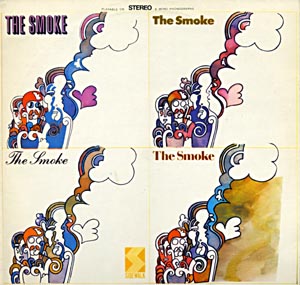
The Smoke The Smoke (1968)
Wonderful singing with almost Beach Boys-like harmonies, catchy melodies, orchestration and strong production values are the hallmarks of the sole sunshine pop, psychedelic, self-titled album by The Smoke, not to be confused by the British group Smoke from the same era. It's pretty short at just under 30 minutes, and it contains more traditional psychedelic songs, along with brief, more experimental tracks.
"Cowboys and Indians" is a memorable anti-war song, with liberal use of organ. "Self-Analysis" has lyrics that sound like a diary entry, with creative instrumentation including piano, strings and compelling percussion. "Gold is the Color of Thought" has more liberal use of strings and moves back and forth between more baroque sections on the verses, and rock for the choruses, with an inventive coda that effective marries both elements. At 4 minutes, "Hobbit Symphony" is the longest track on the album, and it's an eclectic instrumental that includes traditional rock, hints of old-fashioned '20's & '30's music, polka, surf, klezmer, gypsy music and even goes into the avant-garde.
Side two starts with "Fogbound," which makes interesting use of brass. "Umbrella" sounds like a mix between the Beach Boys and the more playful, childlike side of British '60's psychedelia. The well-orchestrated "October Country" is one of the true highlights - a very melodic and catchy song that could have been a big hit. In fact, Michael Lloyd, who co-produced the album with Kim Fowley and wrote most of the songs, produced another album also in 1968 by the group October Country, which featured the same song, as well as "Cowboys and Indians," but both versions were inferior to the versions by The Smoke. The album concludes with the poetic and creative "Odyssey," that would fit well on any compilation of great '60's tunes, and includes some great lines like:
"There is wind that blows 'cross the open sea,
there is wind that can blow you ashore.
It can lift you to a fortune or three,
or can crush you to the floor,
what's more,
it can cut you to the core."
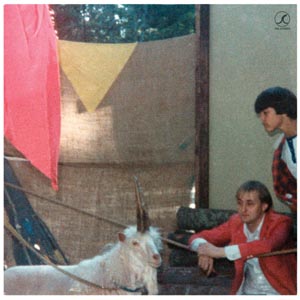
Bobb Trimble Harvest of Dreams (1982)
Passion. Longing. Heartbreak. Many a song and album have been dedicated to these themes, but rarely have they been done with this much poignancy, urgency, beauty and strangeness. His musicianship and creativity is truly impressive, the sound is full, and each song was lovingly crafted and produced and fiddled with until it was just perfect. Some will be put off by Bobb's feminine-sounding falsetto, or the distant, otherworldly and ethereal nature of the material, but for those who can dive in, it's mesmerizing, hypnotic, fragile and beautiful beyond comprehension - a true masterpiece unlike anything you've ever heard. And who could have guessed that one of the very best psychedelic albums of the 1960's would be released in anachronistic fashion in 1982?
The opening track, "Premonitions - The Fantasy," is full of hope and optimism. It's about a relationship (like most songs on the album), post-break-up, but the singer either doesn't know it yet, or won't accept it, and is still in wonderland about how amazing this person is. The song is 6-minutes and goes by in a heartbeat leaving you wanting more, which is a good thing, as this song will soon reappear. On "If Words Were All I Had," the heartbreak sinks in, with lyrics about a lost love that are achingly painful, yet intimately relatable. You're immediately filled with sympathy, empathy and compassion, and boy does he make it sound beautiful with heavily treated lyrics and electric guitar:
"Oh, you're so beautiful,
more than true and blue,
so beautiful,
don't know what to do.
You are so beautiful,
I just can't get through,
so beautiful,
I'm in love with you.
When are you coming home?"
He also says:
"But if your love was all I had,
I'd leave the world behind,
and if your love would stay in my heart,
what better world could I find?"
That leads into "The World I Left Behind," which is 2 minutes of silence, a daring and fitting blank space on the album that allows everything to really sink in. There are literally no words for the heartbreak he feels, and he expresses it with a literal emptiness.
People often say things like "you haven't really lived until you've…" and then fill in the blank. The 7 1/2 minute "Armor of the Shroud" is one of those songs where perhaps you really have NOT lived until you've heard it. Here we go deeper and deeper into the longing and loss and strangeness, and he even manages to compare himself to the sacrifice and crucifixion of Christ in the lyrics. At some point, the incredible music dissolves into an array of sound effects; walking up and down stairs, weapons fire from an early video arcade game, and then the song fades out completely, only to fade back in for another 90 seconds that's reminiscent of a legendary Barrett-era Pink Floyd coda. The song ends with a telephone operator saying, "We're sorry, you have dialed a number which cannot be reached from your calling area," which in its simplicity perfectly encapsulates hanging on to a lost love now long gone.
"Premonitions - The Reality," is almost exactly the same song as the opening track "Premonitions -The Fantasy," where he again becomes lost in the fantasy of the beauty of this lost relationship, but now we hear it in an entirely different light, and we know that his delusion has returned, even going as far as to rename the song "The Reality," but that doesn't make the fantasy any more real.
So as not to go on at the extreme length that this album deserves, the songs on side two are filled with more heartache, beauty, melody and strangeness than you could ever hope for on an album. "Take Me Home Vienna" could have been a hit in an alternate dimension. "Selling Me Short While Stringing Me Long" has so much reverb and echo and fuzzy distorted guitar that you'll go mad with delight. "Oh Baby" is short, and starts with an awesome backwards section before dissolving into a very amateur song backed up by a bunch of young local kids (known as "The Kidds") singing and playing instruments badly and stilted, but somehow it fits as a brilliant interlude. "Paralyzed" is filled with lovely distortion, and continues thematically:
"Oh baby, you've got me going out of my head,
wrapped up in a world that I once fled.
Oh I'm so sorry, baby, but my hands are tied.
Oh baby, oh baby, you've got me paralyzed."
The final track, "Another Lonely Angel" starts with a highly atypical and frantic, almost punk-like section before morphing into the usual lyrical/guitar madness, and the song ends in a morass of sound effects, unresolved emotion and strangeness that the album truly deserves.
Harvest of Dreams is a weird and wonderful album; a song of complete silence, a song virtually repeated, a song played by amateur adolescents and a smorgasbord of special effects. In an alternate universe where genius was truly recognized, this album would have propelled Trimble into superstardom.
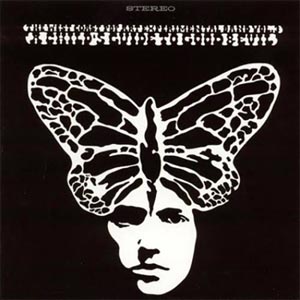
The West Coast Pop Art Experimental Band Vol. 3: A Child's Guide To Good And Evil (1968)
Boasting one of the longest titles and best album covers of the era, this is the WCPAEB's third album, and it's by far their most consistent, containing much of their best work. It was released on Reprise, certainly not an obscure label, but this deserves a MUCH wider audience.
Side one is the straight-ahead psychedelic song side, and while the lyrics are sometimes a bit wonderfully nonsensical, the singing is clear and edgy, and the album side is filled with instant classics, perhaps none more so than the opener "Eighteen is Over the Hill." The song is a wonder of beautiful vocal harmonies and dynamic song structure that evokes feelings of endless possibilities.
"In the Country" starts with some great fuzz guitar, accompanied by more melodic electric guitar and lyrics that were indicative of where the hippie movement was heading at the time:
"San Francisco is dead.
In L.A. no one's on the street.
Let's go off on our own,
in the country."
"Ritual #1" contains sitar, fuzz guitar, inventive percussion and takes you on a compelling psychedelic journey. "Our Drummer Always Plays in the Nude" is a really fun song. "As the World Rises and Falls" is a beautiful, dreamy ballad, and "Until the Poorest People Have Money to Spend" is a moving fuzz and sitar monster track.
Side two is altogether more experimental and wacky, with some songs that are true head scratchers, but you always have to admire their creativity and audacity. "Watch Yourself" contains sounds of a crowd, bongo drums, a great heavy fuzz riff and lyrics that warn men against a woman that will cause you nothing but misery. It also contains a great self-referential moment where the singer emphatically states slowly in a spoken voice that "You've been listening to the West Coast Pop Art Experimental Band." It ends with a nice guitar solo.
And then things get pretty weird. "A Child's Guide to Good and Evil" is a seriously warped song with more sitar and vocalized harmonies, and lyrics that are more spoken than sung:
"Take my hand and run away with me,
through the forest until the leaves and trees slow us down.
A vampire bat will suck blood from our hands,
a dog with rabies will bite us,
rats will run up your legs,
but nothing will matter."
"A Child of a Few Hours is Burning to Death" is very odd and disturbing, but makes for a surprisingly effective anti-war statement:
"A child of a few hours is burning to death.
Her eyes are full of smoke, her mouth is full of fire.
Napalm is perfect for women and children.
Forgive us, forgive us."
The album ends with the relatively brief "Anniversary of World War III," which is perhaps the greatest anti-war song of all time, as its 90 seconds of absolute and complete silence, a truly daring way to end an amazingly diverse classic of creativity.